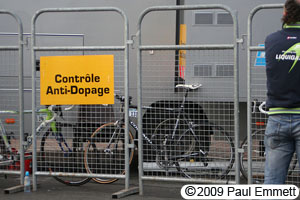 Rasmus Damsgaard, the man who’s partnership with Bjarne Riis helped pioneer anti-doping efforts in cycling, will no longer be working with the Saxo Bank team in 2010. Instead, Damsgaard’s company Clearidium will be working directly for the International Cycling Union (UCI) next year to help improve the overall anti-doping efforts in cycling. His new partnership with the UCI made it impossible for the Dane to continue the private program with Riis’ team.
Rasmus Damsgaard, the man who’s partnership with Bjarne Riis helped pioneer anti-doping efforts in cycling, will no longer be working with the Saxo Bank team in 2010. Instead, Damsgaard’s company Clearidium will be working directly for the International Cycling Union (UCI) next year to help improve the overall anti-doping efforts in cycling. His new partnership with the UCI made it impossible for the Dane to continue the private program with Riis’ team.
In Autumn of 2006 both Riis and Damsgaard started the first private anti-doping program based on information and the concept 12-4-4 – 12 blood profiles, 4 steroid profiles and 4 EPO profiles a year. This groundbreaking work is today the backbone of the UCI’s biological passport that was introduced in 2008.
“We have been extremely pleased with the partnership with Rasmus Damsgaard and we are very proud of the results we accomplished together. We started our work back in the autumn of 2006 and the result was an intelligent anti-doping program, Which today is the foundation of the UCI biological passport. We are therefore confident that the anti-doping program implemented by the UCI will be of outstanding quality,” explained Saxo Bank’s Bjarne Riis.
Damsgaard is equally proud of the work the two have done together in the fight against doping in cycling stating, “Without Bjarne’s vision and determination I’m not sure that the fight against doping would be as successful as it is today. Bjarne and I first talked together in August 2006 and we agreed two develop the most ambitious anti-doping program ever. Today many of the components from the program are incorporated in the biological passport of the UCI and that is for me a great success.”
During the 2009 season the UCI’s biological passport program began to show its promise, and cycling’s governing body will soon see their pioneering efforts expanded to other sports as the World Anti-Doping Agency (WADA) begins to expand the system globally.